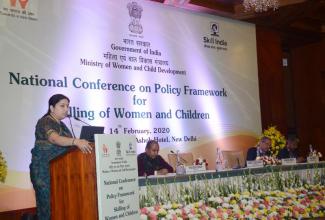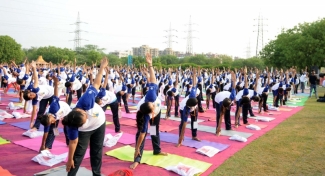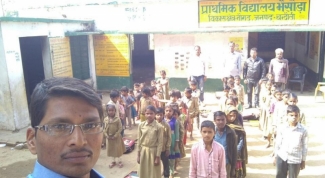
The Ministries of Women & Child Development (WCD) and Skill Development & Entrepreneurship are partnering to enable and empower the women and youth of India with skilling in every segment where India is competent to make a mark said the Union Minister of WCD and Textiles Smriti Zubin Irani in New Delhi today. She was speaking at the inaugural session of the day long national Conference on Policy Framework for Skilling of Women and Children being held in the city.
Union Minister for Skill Development and Entrepreneurship Mahendra Nath Pandey in his opening remarks said that India’s demographic dividend, where 65 percent of the population is in the working age group of 29 years, gives an opportunity for India to be the skill capital of the world. To harness India’s advantage in human capital the Skill India Mission envisions translating India’s demographic advantage into productivity dividend by enabling jobs and entrepreneurial opportunities in sync with the aspirations and abilities of India’s youth.
He further said that since women participation in the labour force for India is low at 17.5 percent, skill development becomes critical for women empowerment as it has positive correlation not only with better economic opportunities but also overall with social recognition, confidence and financial independence.
While Government’s skill programmes, both short term and long term, through Industrial Training Institutes do not discriminate against women in terms of participation, we need dedicated interventions to make the overall skill ecosystem more responsive and friendly for the female participants, the Minister added.
According to the sixth economic census (2013-14), 14% or 8.05 million establishments were owned by women in India. To enable breaking of the glass ceiling, women should feel safe, secure and free to pursue their passion. Government of India has taken a comprehensive view of providing security to women transcending beyond physical security to cover aspects related to healthcare, social empowerment (through Swachh Vidyalaya, Ujjwala), differentiated financial incentives to working women and dedicated interventions to educate the girl child.
From an economic point of view, the glass ceiling can be broken by facilitating increase in the number of hours spent by women on the job, and including them in higher-productivity sectors. There is a need to make the grassroots aware of the above Government initiatives and continuously improve the implementation of these initiatives to effect a mind-set change for accelerating the gender parity movement.
The ecosystem for short and long term skilling can also look at innovative ways like providing child care facilities for women participants to make it more responsive to their needs.
We are in the midst of the Industrial Revolution (IR) 4.0 and the economies that will succeed in this revolution will be those that are able to realize the full potential of their human capital. India with its robust start-up ecosystem and leading technology sector has the opportunity to be one of the leaders in IR 4.0.
The country could add up to USD 770 billion—more than 18%—to its GDP by 2025, simply by giving equal opportunities to women, according to a report by the McKinsey Global Institute. Channelizing the available female talent for the new age economy is therefore quintessential to realize the full potential of human capital. Currently roughly 10% founders in the Indian startup industry are females. Again, India has the second-largest artificial intelligence (AI) workforce but only 22 per cent of roles filled by women.
The inclusion agenda of the Government of India entails creating opportunities for the traditionally disadvantaged sections including children from the Child Care Institutions which currently house 3.7 Lakh children living in 9500 institutions and differently-abled individuals especially women.
The conference is being attended by officials of the Ministries of WCD, Skill Development & Entrepreneurship, Principal Secretaries and Secretaries of WCD from the States, industrial organisations, corporate houses and institutions.
The conference will discuss issues like strengthening skill and entrepreneurship landscape for women, promoting skills in traditional and non-traditional sectors, creating a secured environment for breaking the glass ceiling and promoting entrepreneurship for children from CCIs, women and special individuals.











